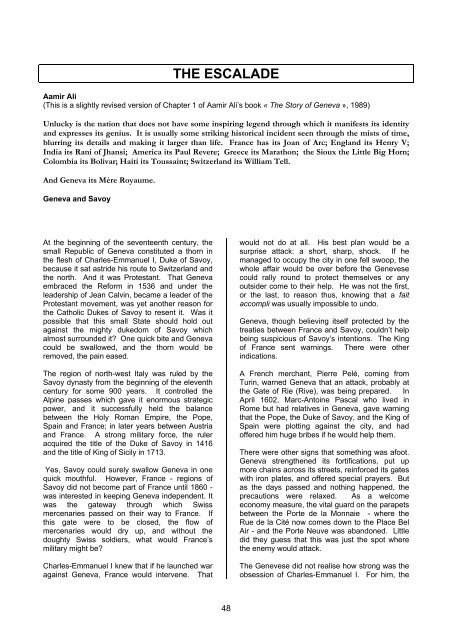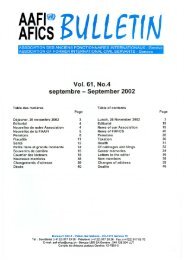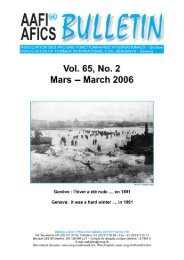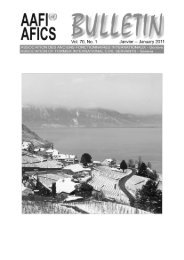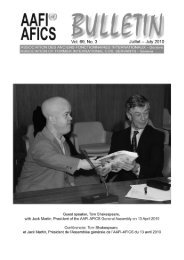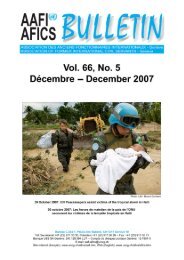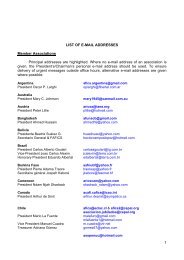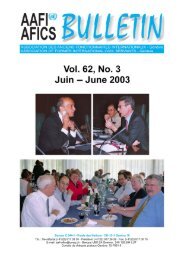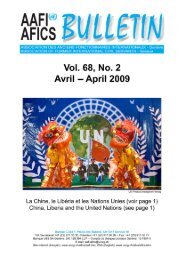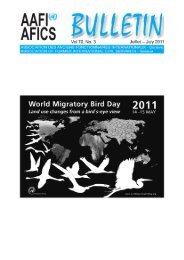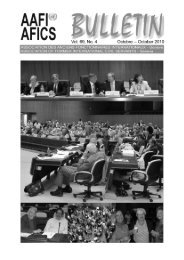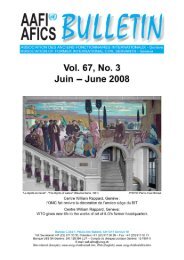nouvelles de notre association - aafi-afics - UNOG
nouvelles de notre association - aafi-afics - UNOG
nouvelles de notre association - aafi-afics - UNOG
Create successful ePaper yourself
Turn your PDF publications into a flip-book with our unique Google optimized e-Paper software.
THE ESCALADE<br />
Aamir Ali<br />
(This is a slightly revised version of Chapter 1 of Aamir Ali’s book « The Story of Geneva », 1989)<br />
Unlucky is the nation that does not have some inspiring legend through which it manifests its i<strong>de</strong>ntity<br />
and expresses its genius. It is usually some striking historical inci<strong>de</strong>nt seen through the mists of time,<br />
blurring its <strong>de</strong>tails and making it larger than life. France has its Joan of Arc; England its Henry V;<br />
India its Rani of Jhansi; America its Paul Revere; Greece its Marathon; the Sioux the Little Big Horn;<br />
Colombia its Bolivar; Haiti its Toussaint; Switzerland its William Tell.<br />
And Geneva its Mère Royaume.<br />
Geneva and Savoy<br />
At the beginning of the seventeenth century, the<br />
small Republic of Geneva constituted a thorn in<br />
the flesh of Charles-Emmanuel I, Duke of Savoy,<br />
because it sat astri<strong>de</strong> his route to Switzerland and<br />
the north. And it was Protestant. That Geneva<br />
embraced the Reform in 1536 and un<strong>de</strong>r the<br />
lea<strong>de</strong>rship of Jean Calvin, became a lea<strong>de</strong>r of the<br />
Protestant movement, was yet another reason for<br />
the Catholic Dukes of Savoy to resent it. Was it<br />
possible that this small State should hold out<br />
against the mighty dukedom of Savoy which<br />
almost surroun<strong>de</strong>d it? One quick bite and Geneva<br />
could be swallowed, and the thorn would be<br />
removed, the pain eased.<br />
The region of north-west Italy was ruled by the<br />
Savoy dynasty from the beginning of the eleventh<br />
century for some 900 years. It controlled the<br />
Alpine passes which gave it enormous strategic<br />
power, and it successfully held the balance<br />
between the Holy Roman Empire, the Pope,<br />
Spain and France; in later years between Austria<br />
and France. A strong military force, the ruler<br />
acquired the title of the Duke of Savoy in 1416<br />
and the title of King of Sicily in 1713.<br />
Yes, Savoy could surely swallow Geneva in one<br />
quick mouthful. However, France - regions of<br />
Savoy did not become part of France until 1860 -<br />
was interested in keeping Geneva in<strong>de</strong>pen<strong>de</strong>nt. It<br />
was the gateway through which Swiss<br />
mercenaries passed on their way to France. If<br />
this gate were to be closed, the flow of<br />
mercenaries would dry up, and without the<br />
doughty Swiss soldiers, what would France’s<br />
military might be?<br />
Charles-Emmanuel I knew that if he launched war<br />
against Geneva, France would intervene. That<br />
would not do at all. His best plan would be a<br />
surprise attack: a short, sharp, shock. If he<br />
managed to occupy the city in one fell swoop, the<br />
whole affair would be over before the Genevese<br />
could rally round to protect themselves or any<br />
outsi<strong>de</strong>r come to their help. He was not the first,<br />
or the last, to reason thus, knowing that a fait<br />
accompli was usually impossible to undo.<br />
Geneva, though believing itself protected by the<br />
treaties between France and Savoy, couldn’t help<br />
being suspicious of Savoy’s intentions. The King<br />
of France sent warnings. There were other<br />
indications.<br />
A French merchant, Pierre Pelé, coming from<br />
Turin, warned Geneva that an attack, probably at<br />
the Gate of Rie (Rive), was being prepared. In<br />
April 1602, Marc-Antoine Pascal who lived in<br />
Rome but had relatives in Geneva, gave warning<br />
that the Pope, the Duke of Savoy, and the King of<br />
Spain were plotting against the city, and had<br />
offered him huge bribes if he would help them.<br />
There were other signs that something was afoot.<br />
Geneva strengthened its fortifications, put up<br />
more chains across its streets, reinforced its gates<br />
with iron plates, and offered special prayers. But<br />
as the days passed and nothing happened, the<br />
precautions were relaxed. As a welcome<br />
economy measure, the vital guard on the parapets<br />
between the Porte <strong>de</strong> la Monnaie - where the<br />
Rue <strong>de</strong> la Cité now comes down to the Place Bel<br />
Air - and the Porte Neuve was abandoned. Little<br />
did they guess that this was just the spot where<br />
the enemy would attack.<br />
The Genevese did not realise how strong was the<br />
obsession of Charles-Emmanuel I. For him, the<br />
48


